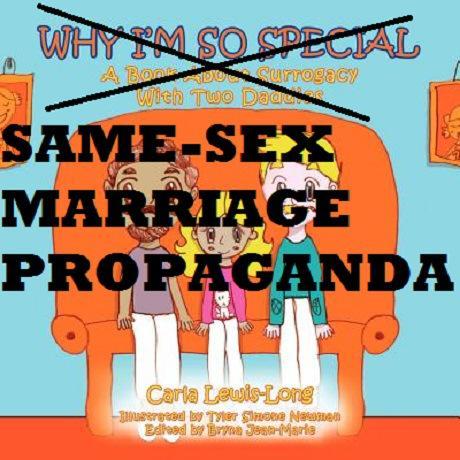
Until recently, a long-standing conviction of sociologists is that children do better — as measured by their educational achievement, behavior problems, and emotional well-being — in married, heterosexual, two-parent households, when contrasted to single mothers, cohabiting couples, adoptive parents, divorced parents, and same-sex parents. As an example, in their 1994 book Growing Up With A Single Parent, sociologists Sara McLanahan and Gary Sandefur wrote, “If we were asked to design a system for making sure that children’s basic needs were met, we would probably come up with something quite similar to the two-parent ideal.” (Slate)
However, one of the arguments by supporters of same-sex marriage is that children of same-sex parents don’t do any worse than children of opposite-sex parents. Due to the Tyranny of Political Correctness, as well as flawed research methodology (e.g., small sample size), there’s been a scarcity of scientific data on how children of same-sex parents fare.
As Michael Cook points out in MercatorNet, Feb. 9, 2014, until recently nearly all studies of same-sex parenting were very small. One researcher found in a survey of 49 studies in 2010 that their mean sample size was only 39 children, and that only 4 of the 49 studies were random samples. The number of children being raised by same-sex couples is so small – 0.005% of American households with children — that capturing them in a random sample is like finding a needle in a haystack. The small and non-random samples, in turn, raise legitimate questions about the validity and generalizability of the studies.
But now, a study by Catholic University of America sociologist Donald Paul Sullins has overcome those methodological problems by employing more data than any previous study — a representative sample of 207,007 children, 512 of whom with same-sex parents, from the U.S. National Health Interview Survey.
Sullins writes in “Emotional Problems among Children with Same-Sex Parents: Difference by Definition” in the peer-reviewed British Journal of Education, Society & Behavioural Science. that the two groups of children (same-sex vs. opposite-sex parents) were compared using twelve measures of emotional problems, developmental problems, and affiliated service and treatment usage, with controls for age, sex, and race of child and parent education and income. Instruments included the Strengths and Difficulties Questionnaire (SDQ) and the Kessler Scale of Psychological Distress (SPD).
Sullins found that “Emotional problems were over twice as prevalent (minimum risk ratio (RR) 2.4, 95% confidence interval (CI) 1.7-3.0) for children with same-sex parents than for children with opposite-sex parents…. Joint biological parents are associated with the lowest rate of child emotional problems by a factor of 4 relative to same-sex parents, accounting for the bulk of the overall same-sex/opposite-sex difference.” The emotional problems included misbehavior, worrying, depression, poor relationships with peers and inability to concentrate.
In his study, Sullins examined whether other factors could explain the difference in the children’s emotional welfare, but concluded that none of them does. Those factors include:
- Instability: Children do not flourish in unstable environments. Gay and lesbian parents tend to rent rather than to own their own houses, which involves the trauma of pulling up stakes and resettling. Parental psychological distress is also associated with children’s increased risk of emotional problems. But Sullins found that neither renting nor parental psychological distress explains the differences in emotional well being of children.
- Homophobia: The most widely-accepted explanation of poor emotional and behavioral results amongst children in same-sex households is homophobia. Supporters of same-sex parenting attribute poor emotional well-being to stigmatization. These kids are damaged, it is said, because they have been singled out, teased and bullied. If their peers were less homophobic, things would be different. But Sullins dismisses this. “Contrary to the assumption underlying this hypothesis, children with opposite-sex parents are picked on and bullied more than those with same-sex parents.”
Sullins concludes that “it is no longer accurate to claim that no study has found children in same-sex families to be disadvantaged relative to those in opposite-sex families.” As he puts it:
Joint biological parentage, the modal condition for opposite-sex parents but not possible for same-sex parents, sharply differentiates between the two groups on child emotional problem outcomes. The two groups are different by definition. Intact opposite-sex marriage ensures children of the persistent presence of their joint biological parents; same-sex marriage ensures the opposite. However, further work is needed to determine the mechanisms involved.
Sullins emphasizes that it is not that all children in same-sex homes will be emotionally damaged — “Most children in most families achieve a level of psychosocial function that is not characterized by serious emotional problems.” However, even if most kids are all right, more of them are all right in intact marriages with their opposite-sex biological parents.
According to MercatorNet editor Michael Cook, Sullins’ defiant rebuttal of the “no difference” hypothesis is sure to stir up a hornet’s next as the Supreme Court prepares to trawl through arguments for and against same-sex marriage, because it will be impossible for critics to ignore Sullins’ research findings.
But Cook also warns that Sullins should be “ready to go all 15 rounds” because he surely will be besieged by detractors. Cook points out that when University of Texas sociologist Mark Regnerus attacked the “no difference” hypothesis, his career was almost destroyed by trolls who trashed his data, his competence and his integrity.
Please pray for Donald Paul Sullins, a married Catholic priest with three children (he used to be an Episcopalian), and Professor of Sociology at the Catholic University of America, Washington, D.C.
To send Professor Sullins a message of support, here’s his email address:
~Éowyn

